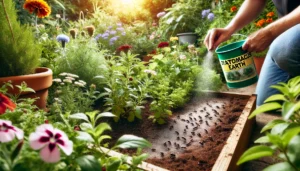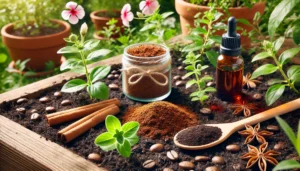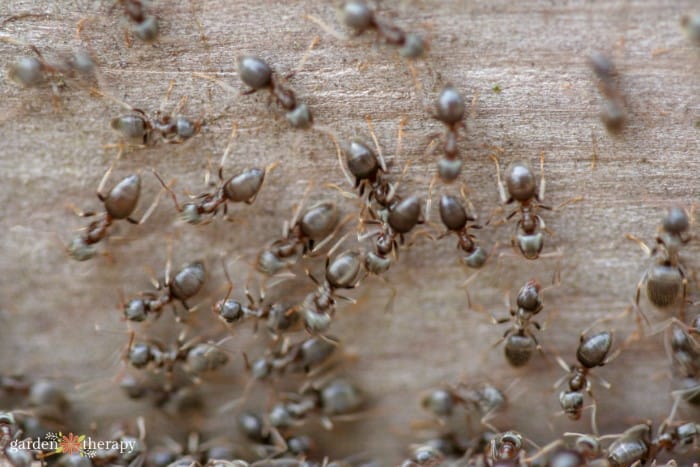How to Get Rid of Ants in the Garden Naturally

Ants may be small, but they can cause big problems in your garden. While they play a role in the ecosystem by aerating soil and helping with decomposition, they can also protect garden pests like aphids, disturb plant roots, and even create unsightly mounds. If you’re looking for natural ways to get rid of ants in the garden naturally, you’re in the right place. Instead of using harsh chemicals, you can rely on eco-friendly methods that are safe for your plants, beneficial insects, and the environment. Here are some effective strategies to get rid of ants in the garden naturally. get rid of ants in the garden naturally
1. Use Diatomaceous Earth (DE)
Diatomaceous earth is a natural, non-toxic powder made from fossilized algae. It works by dehydrating ants and other insects upon contact. To use it:
- Sprinkle a thin layer of food-grade DE around ant trails, nest entrances, and plant bases.
- Reapply after rain or watering for continuous protection.
- Ensure the DE remains dry, as moisture reduces its effectiveness.
- Use caution when applying, as inhaling DE dust can irritate the lungs.
2. Try White Vinegar Spray
White vinegar disrupts ants’ scent trails and repels them due to its strong acidic smell. To make a DIY ant spray: get rid of ants in the garden naturally
- Mix equal parts white vinegar and water in a spray bottle.
- Spray directly on ant trails, nest entrances, and affected areas.
- Repeat daily until you get rid of ants in the garden naturally.
- Be mindful when using near delicate plants, as vinegar can affect plant growth.
3. Use Cinnamon or Coffee Grounds
Both cinnamon and coffee grounds act as natural repellents because ants dislike their strong scents. Simply:
- Sprinkle ground cinnamon or used coffee grounds around plant bases, garden edges, and entry points.
- Reapply after rain for lasting results.
- Consider using cinnamon essential oil mixed with water for a more potent spray.
- Coffee grounds also add organic material to the soil, benefiting your plants.
4. Deploy Citrus Peels
Citrus peels contain natural compounds, such as d-limonene, that ants avoid. To use:
- Place fresh citrus peels near ant trails and nests.
- Blend citrus peels with water to create a natural insecticide and pour the mixture into ant-infested areas.
- Use lemon juice diluted with water to wipe down surfaces where ants are commonly seen.
- Compost excess peels to enrich your garden soil and get rid of ants in the garden naturally.
5. Introduce Beneficial Insects
Certain insects act as natural predators to ants and their food sources. Ladybugs, spiders, and nematodes help control ant populations by reducing their primary food sources, such as aphids and other pests. To encourage beneficial insects:

- Plant flowers like marigolds, daisies, and lavender to attract them.
- Avoid chemical pesticides that harm beneficial insects.
- Provide a habitat by keeping diverse plant life and natural cover in your garden.
- Release beneficial nematodes into the soil to target ants and other harmful pests.
6. Create a Natural Ant Barrier
Ants avoid crossing certain substances, so setting up natural barriers can help get rid of ants in the garden naturally. Effective barriers include:
- Drawing chalk lines or using crushed chalk powder around entry points.
- Sprinkling cayenne pepper, turmeric, or baking soda around plants and garden borders.
- Laying out food-grade DE in a perimeter around your plants.
- Using strips of copper tape or double-sided tape around plant pots to deter ants.
7. Boiling Water for Direct Nest Removal
For severe infestations, boiling water can be used as a direct and effective method for eliminating ant colonies. To do this safely:
- Identify the main ant nest entrance before applying the water.
- Carefully pour boiling water directly into the nest to destroy the colony.
- Repeat as necessary to get rid of ants in the garden naturally.
- Use caution near delicate plant roots to prevent unintentional damage.
8. Maintain a Clean Garden
A tidy garden discourages ants from settling in. To keep your garden ant-free:
- Remove fallen fruit, food scraps, and excess organic material that may attract ants.
- Regularly inspect plants for aphid infestations since ants farm them for honeydew.
- Keep mulch and compost bins away from plant bases to reduce nesting opportunities.
- Store pet food and birdseed in sealed containers to prevent attracting ants.
- Use raised garden beds or pot barriers to minimize ant access to plants.
9. Use Essential Oils as a Natural Repellent
Certain essential oils have powerful ant-repelling properties. Consider using:
- Peppermint oil: Mix 10-15 drops with water and spray around entry points.
- Tea tree oil: Blend with water and apply near nests and pathways.
- Eucalyptus oil: Use a few drops around plant beds to deter ants.
- Clove oil: Its strong scent disrupts ant pheromone trails.
- Reapply oils every few days or after rainfall for continued effectiveness.
Final Thoughts
Controlling ants naturally is not only effective but also safer for your garden, pets, and the environment. By implementing these eco-friendly methods, you can keep your garden thriving while maintaining a balanced ecosystem. Each garden is different, so combining multiple solutions may yield the best results. Regular monitoring and preventative measures can help get rid of ants in the garden naturally.
Do you have a favorite natural method for repelling ants? Share your tips in the comments!
